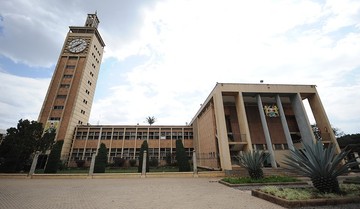Kenyan MPs vote to pull out of ICC’s jurisdiction
September 5, 2013 (NAIROBI) – Kenya’s parliament on Thursday voted to pull out of the jurisdiction of the international criminal court (ICC) in a symbolic move as an ICC spokesperson said withdrawal will not affect the impending trials of President Uhuru Kenyatta and his deputy William Ruto.

Kenya’s parliament is dominated by the Jubilee Coalition which brought Kenyatta and Ruto to power.
The voting saw the walkout of parliament opposition members led by former Prime Minister Raila Odinga.
Kenyatta and Ruto were charged by the ICC for crimes against humanity for their alleged role in the 2007 Kenya election violence which left about 1,200 dead and 600,000 displaced from their homes. The two men deny the charges saying it is politically motivated.
The violence erupted after allegations of electoral fraud following the announcement that Mwai Kibaki won the majority of votes for the presidency against his main rival Raila Odinga.
Former UN Secretary General Kofi Annan brokered a power-sharing deal between the Orange Democratic Movement (ODM) headed by Odinga and Party National Unity (PNU) led by Kibaki.
Furthermore, they agreed that perpetrators of the violence would face justice. A commission of inquiry was formed to investigate the violence and recommended those behind it should be tried in Kenya or The Hague.
The ICC intervened after the Kenyan parliament shot down several attempts to establish a local tribunal and many MP’s said they wanted the cases investigated at the Hague.
Kibaki and Odinga gave the ICC prosecutor the green light to initiate prosecutions in late 2009 without making an explicit referral.
However, once the ICC prosecutor named the suspects he wants the judges to charge, the Kenyan government announced its intention to request a deferral pursuant to Article 16 of the Rome Statute which allows the UNSC to suspend the court’s process in a specific case for 12 months that can be renewed indefinitely.
After Kenyatta and Ruto won the elections, they pushed the AU to issue a resolution to drop the case or refer the case back to Kenyan courts.
The ICC judges can refer the cases back only if similar cases are brought against the pair in Kenyan courts.
Ruto’s trial at the Netherlands based court begins on Tuesday next week while Kenyatta’s begins in November.
The passing of the motion will now be followed by a bill that has to be tabled in the country’s parliament in the next 30 days to formally cut ties with the ICC.
If enacted, Kenya would be the first country to pull out of the court. An MP was quoted as saying the reason for passing the motion on pulling out of the ICC is to ”protect Kenyan citizens” and ”defend the sovereignty of the nation of Kenya.”
The ICC has been criticised by African leaders for allegedly targeting Africans, an allegation the court has denied.
On Thursday the ICC’s Chief Prosecutor, Fatou Bensouda said witnesses against Kenyatta and Ruto had been persuaded with bribes and in some cases threatened.
Established by the Rome Statute in 2002, the ICC was set to trial persons accused of heinous crimes such as genocide, crimes against humanity and war crimes.
The Rome statute which established the court has been ratified by 122 countries, 34 of them in Africa, including Kenya.
Amnesty International released a statement condemning today’s vote.
“Today’s vote is a disturbing attempt to deny justice to the hundreds of thousands of people who were driven from their homes or killed in the post election violence in 2007-8”, said Netsanet Belay, Africa Director at Amnesty International.
“It is unacceptable to try and protect those facing prosecution for alleged crimes against humanity and allow them to evade justice. This also sets a dangerous precedent for the future of justice in Africa”, Belay added.
African NGO’s echoed same sentiments.
“Kenyan suspects have been emboldened by the support of the AU and some African leaders and now use their leadership position to have Kenya out of the ICC”, said Oby Chibuluma, spokesperson of SACCORD, a Zambia-based NGO. “African leaders committed to justice for victims must vehemently denounce such action.”
“The act by the Kenyan government to withdraw its membership from the Rome Statute and the ICC is only a move to protect individuals within Kenya but not the 600,000 citizens who suffered from the post-election violence and today live with fresh memories, the wounds, the disappeared, the dead relatives and are waiting for justice”, said Daniel Okello, coordinator of Lira NGO Forum in Uganda.
“The Kenya of today is the same Kenya that committed to the Rome Statute and the establishment of ICC in 2002, the difference is individuals who have assumed power now and then….This is not the interest of Kenyans”, Okello said.
(ST)
